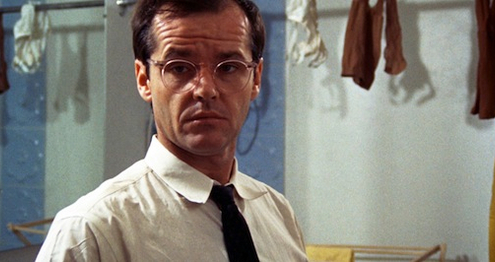There can be little doubt that Jack Nicholson is one of the greatest movie stars in the history of the medium. He’s had more Oscar nominations (twelve) and wins (three) than any other actor and has been an A-list star for over forty years now, remaining a legitimate box office draw in films like “Something’s Gotta Give” and “The Departed” even in his seventh decade. He’s worked with everyone from Antonioni to Scorsese, and given some of the most iconic screen performances ever, from “Easy Rider” to “The Shining.”
Indeed, ask a cinephile for their favorite Nicholson performance, and the same few films are likely to come up: “Easy Rider,” “Five Easy Pieces,” “Carnal Knowledge,” “The Last Detail,” “Chinatown,” “The Passenger” (an amazing, nearly back-to-back six-year-run), “One Flew Over The Cuckoo’s Nest,” “The Shining.” But this means that some of the actor’s equally strong performances never quite made it into the canon, overshadowed by his better-known works. Jack turned 75 yesterday, on April 22nd, and to celebrate the occasion, we’ve picked out five underseen, undersung and underrated Nicholson performances that deserve to be talked about in the same breath as his most acclaimed fare. Check them out below, and weigh in with your own favorite Nicholson performance.
 “The King Of Marvin Gardens” (1972)
“The King Of Marvin Gardens” (1972)
By 1972, Jack Nicholson and Bob Rafelson were old collaborators. Rafelson had directed Nicholson’s script for “Head” in 1968, before producing “Easy Rider,” the film that made Nicholson a star, through his Raybert banner (soon to change its name to BBS), the following year. And in 1970, Rafelson took his place as one of the most promising young filmmakers around with “Five Easy Pieces,” which won a number of Oscar nominations, including Best Picture and Best Actor. Their follow-up, two years later, was far less well-received. Indeed, “The King of Marvin Gardens” was virtually savaged by critics at the time. But with a few decades of distance, it’s gained far more critical respect, and if nothing else, stands as a early demonstration of Nicholson’s range. Riffing on the same dysfunctional family dynamics as “Five Easy Pieces,” the actor plays David, a late-night talk radio host sunk in a deep dark depression, whose brother Jason (Bruce Dern), a wild-spirited con-man, brings him into a real estate scam in run-down Atlantic City, along with his unpredictable girlfriend Sally (Ellen Burstyn) and her step-daughter Jessica (Julia Anne Robinson), with inevitably tragic consequences. The film (co-written by journalist & Carly Simon lyricist Jacob Brackman) is a decided oddity, a difficult, episodic watch with jarring, surreal scene after jarring, surreal scene. But even to those who don’t respond to it, the relationship between the two brothers is complex and affecting, with Nicholson’s introverted turn made all the more impressive when put up against Dern’s, the friendship between the two giving the fraternal bond real heft. Despite the critical brickbats, the film was an impressive success — the thirteenth biggest-grosser of 1972 — and Nicholson and Rafelson would continue to work together many, many times, up to 1996’s “Blood and Wine.”
 “Reds” (1981)
“Reds” (1981)
As staggering as he can be in the spotlight, Nicholson’s always shown an admirable willingness to take the back seat to other stars for the right people or project, and one of the best examples of that is his performance in his friend Warren Beatty‘s “Reds.” An unlikely epic about the affair between radical journalist John Reed (Beatty) and socialite-turned-activist Louise Bryant (Diane Keaton), the film is an enormously ambitious, unruly affair, with moments of both transient brilliance and eye-rolling artifice. But one of the undoubted highlights is Nicholson, who plays playwright Eugene O’Neill (writer of “Long Day’s Jounrey Into Night,” among others), who had a long, tumultuous affair with Bryant. Nicholson’s drunken turn is a neat contrast with Beatty’s more earnest lead, but this isn’t Jack off the chain: lost in an alcoholic melancholy, he’s entirely aware of how destructive his relationship with Bryant is, but unable to do anything to stop it. The film is full of great performances (it was the last movie to pick up Oscar nominations in all four acting categories, with Beatty, Keaton and Nicholson joining the winning Maureen Stapleton), but Nicholson’s is the one that lingers.

